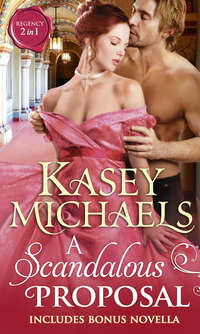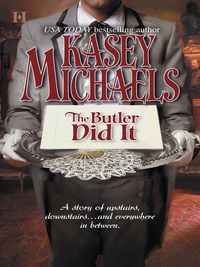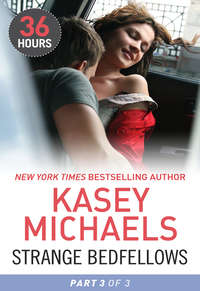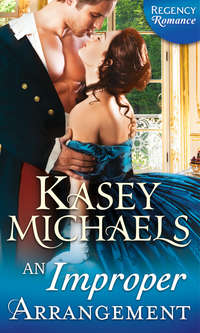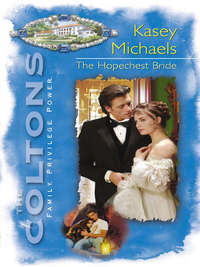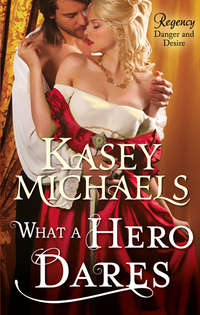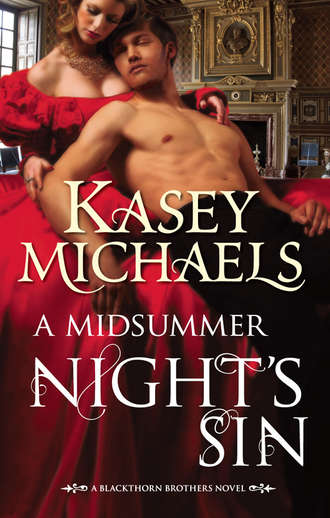
Полная версия
A Midsummer Night's Sin
He looked at her strangely for a moment before he leaned past Doris Ann, opened a small square hinged door and recited the Cavendish Square address.
Regina thought about her aunt, who adored her only daughter. “It’s that terrible? You know who took Miranda?”
“If I knew the who, Miss Hackett, I would have handed you over to my coachman and sent you on your way, and damn your problems with your respective parents when they discovered you’d been at the masquerade. But I only learned a possible why, I believe, which makes the where immaterial.”
Thoughts no well-bred young lady should know enough about to even consider went flashing through Regina’s head. But her father owned a shipping company, and he had told many stories at the dinner table about mysterious cargos, human cargos, being shipped off to foreign parts, where the men and children were sold into slavery and the most comely women paraded about on stages, for sale to the highest bidder. He seemed to delight in the telling, probably because each only served to make his wife ill and to seek ever more comfort in the contents of a wine decanter.
How she hated her father.
How she feared for Miranda.
Regina put her hand on Mr. Blackthorn’s forearm. “We must find her. We must.”
He covered her hand with his own. “And I will.”
“No,” she corrected him. “We will. This is my fault. I should have said no. Miranda’s incurably silly, but she wouldn’t have gone if I had refused to accompany her. I should have known better. If you will not assist me, I will investigate on my own. I will. Really.”
He looked at her for long moments, saying nothing until the coach drew to a halt outside of Number Twenty-three.
“Very well. Your uncle will call in the Bow Street Runners, I’m sure, but we two can conduct our own investigation if it will make you more comfortable, which it very well may not, not once I’ve said what I have to say to your uncle. Still, if you’re of the same mind tomorrow, I will meet you in Hyde Park at eleven. Come on foot, with only your maid.”
“And you’ll be there? You’re not just saying that now to fob me off? Because I know I have been something of an annoyance to you.”
“Miss Hackett … Regina. It is precisely because you have been, in your words, such an annoyance to me that I can safely promise you that, yes, I will be there. Pour mes péchés.”
“For your sins?”
He stroked one long finger along her cheek and over her mouth, stealing her breath.
“Both committed and contemplated, yes,” he said softly. And then he did something that took her totally by surprise—he reached behind her neck and unclasped her pearls, sliding them into his pocket. “You’ve been robbed, remember? I’ll return them to you tomorrow, when you come to the park.”
“Were you thinking I might not come? That I’ll change my mind?”
“The possibility presents itself, yes.”
“Well, I won’t! I’m going to find Miranda, and since you’re the only person who knows we needs must start with what happened at the ball, you’re the only person who can help me.”
A groom opened the door and put down the steps and Mr. Blackthorn eased past Regina and hopped to the ground before turning to hold out his hand to her. “And we begin….”
CHAPTER THREE
THE FIRST THING PUCK noticed once they’d been escorted into the drawing room at Number Twenty-three was the general shabbiness of the place. He would do some investigating of the Earl of Mentmore in the morning, but for now, he believed he could safely assume that if a ransom were demanded for Lady Miranda, the family would be hard-pressed to comply.
Strange. The family had the name but not the money. He and his brothers had the funds but not the name. Of the two circumstances, he believed he preferred his own, and yet, Society looked down its nose at him and accepted Mentmore and his offspring everywhere. A day would come, he felt certain, when one side would have to compromise with the other, and if he were to project a winning side, he would wager on money over birth every time. For one thing, it kept you warmer at night.
“His lordship and my lady will be down shortly,” the starchy butler pronounced from the doorway as Regina, who had been pacing the carpet in front of the fire these past five minutes, mumbled a brief thank-you to the man she called Kettering, then quickly found herself a chair and collapsed into it.
“Wonderful,” Puck pronounced, as if complimenting the man on some lofty achievement. He walked over to the butler and put an arm around the man’s shoulder confidingly. “Kettering, you look an intelligent man. Can I trust you? Your employers are, I fear, about to suffer a great shock. I say this because I am convinced you will know just how to handle the situation. I would suggest wine for the lady, and perhaps some burnt feathers. Brandy for his lordship?”
“He favors gin,” the butler whispered, frowning to show his own distaste for such a lowly spirit and, it would seem, his employer, as well. “Does this concern Miss Miranda, sir?”
“Oh yes, it does, it does,” Puck said, shaking his head, his sorrowful expression saying more than his words, drawing in Kettering as if he were a fish on the hook. “It will be left to a fine man like you to keep body and soul together under this roof, I’m afraid. But if there is anything, anything at all I can do to assist you, please do not hesitate to contact me. In fact, I all but insist upon it.” He then handed the man his card and a small but heavy purse.
Kettering slipped both into his pocket, one eye on Regina, who sat contemplating her shoe tops, blissfully unaware of what Puck was about. “It would be my pleasure, sir,” the butler said. “I will see about refreshments for you and the young lady, as well.”
“Again, wonderful. But no gin for me, if you please. Horrid, bitter stuff.”
“There’s a bottle of wine in the cellars his lordship has been saving. He’ll never know.”
Puck patted the man’s back and then asked his question. “I only met Miss Hackett this evening and, unfortunately, under trying circumstances. Do you know her well?”
Kettering looked about, to make sure no one was listening from the foyer and that his employers weren’t on the stairs. “She’s fine enough, sir. Not that it means anything. The mother is sister to the viscount, but the father?” He leaned closer. “In trade. Owns ships. Bought himself his bride, and now he’s trying to sell the daughter to a title. The family’s that embarrassed, sir.”
Puck kept his smile with some difficulty. The butler looked down on Regina Hackett? What a strange world they all lived in. “And yet she’s welcome here?”
Now Kettering looked positively evil. “It’s like I said, sir. The family’s that embarrassed. If you take my meaning.”
“Yes, I think I do. Pays for all of this, does he?”
The butler seemed to realize that he’d been speaking out of turn and to a complete stranger. “Was there anything else you wanted, sir?”
“Thank you, no. You’ve been extremely helpful.” A gold coin appeared in Puck’s hand and also quickly disappeared.
Kettering looked about himself once more, wet his lips and confided, “The mother, Lady Leticia? Poor thing is nearly always three parts over the windmill, and the father is a nasty piece of work. I’d steer clear if I was you, sir. There’s better pickings out there for a fine, set-up young gentleman, such as yourself.”
“I’ll be sure to keep that in mind. Again, thank you, Kettering. Ah, and I believe his lordship and his lady wife are about to join us. And you have some refreshments to organize. Remember, I’m counting on you to keep me informed. Most especially, I think, about the actions of your master concerning this entire affair.”
“Indeed, sir. He so much as sneezes, sir, you’ll know about it,” Kettering promised, bowing to him before scurrying off, not bothering to announce his employers or their unexpected guests.
Yes, in the end, perhaps in ten years, perhaps not for another hundred, it would be money that would decide who held all the winning cards. Money, and charm. Puck, with all modesty, believed he possessed both in considerable measure.
It was a pity he was bound to be tossed out of this house on his illegitimate ear in the next ten minutes by one of the eventual losers.
“My lord, my lady,” he said, bowing to each of them in turn as they entered the drawing room. “Please pardon the intrusion, but I must tell you that something untoward has occurred. Concerning your daughter, Lady Miranda. Please, I would suggest you both sit.”
“Who the bloody blazes are you?” the viscount asked, his clothing looking as if he’d dressed in haste, a betraying crease on his right cheek announcing that he’d just lately had his head on a pillow.
No, no. I would remain anonymous a while longer.
“The bearer of bad news, I’m afraid. Your daughter has been abducted by brigands.”
Well, that neatly served to distract the viscount from more personal questions, as he was immediately too busy attempting to prop up his fainting wife to ask them.
Regina rushed to her aunt’s side, sparing only a moment to glare at Puck before she assisted her uncle in getting the woman to one of the couches near the fireplace.
The next minutes were spent with the requested burnt feathers being waved beneath her ladyship’s nose by her worried niece while his lordship snagged the decanter of gin from the tray Kettering had produced and drank down two full glasses in quick succession.
Puck stood in front of the fireplace, watching everything, missing nothing, and sipped the wine, which was actually quite fine. Good on Kettering. And good on him, knowing the most direct route to any secret lay with making allies of the servant staff.
At last her ladyship seemed recovered enough to sit up, and the viscount demanded that Puck explain himself.
He, in turn, looked to Regina. “Miss Hackett? If you would be so kind as to get us started?”
The look she shot him this time might have had a less courageous fellow ducking behind a chair, but she didn’t waste more than a few seconds on him before sitting down beside her aunt and taking the woman’s trembling hands in her own.
“We were on our way to the soiree, as you know. Mama was very much looking forward to the lemon squares— Oh, I’m sorry. My nerves are still overset, because that isn’t important, is it? We, that is, the coachman seemed to have gotten lost, turned about in his direction somewhere, I suppose, as he looked for a way around the crush of vehicles on every roadway, and we ended up in a fairly isolated street. Somehow, one of the coach wheels found a hole in the cobbles as we tried to turn the coach, and one of the spokes splintered.” She could not hold back a small sob. “Everything just seemed to go wrong.”
“Incompetent idiot! I’ll have the man’s position!” the viscount bellowed.
And you’ll be within your rights, Puck thought, taking another sip of wine. Can’t blame the coachman for my lies, but he deserves the sack for delivering his master’s daughter to that den of iniquity.
“Yes, uncle, but it would only have been unfortunate save for … for those horrible brigands.” Now she looked to Puck, and there was no mistaking what she wanted him to do.
“Mine own coach was passing by the opening to the street, and I heard a commotion, a woman’s scream. I leaped down from my coach and went hotfoot in pursuit of the source of that scream, mine own coachman and grooms assisting me. We arrived on the scene not able to do much more than take charge after the fact, move the ladies to my coach and offer any other assistance I could. But I can tell you the events that transpired as they were told to me by your coachman.”
“Then tell us, damn it!”
“Yes, my lord, I was about to do just that. It would seem that several creatures of the night saw an opportunity present itself to them and acted upon it, surrounding the coach and demanding all jewelry and money the occupants might have on their persons.”
Lady Claire choked back a sob. “But—but there was no money, and those pearls were paste—”
“Claire, that will be enough,” her husband warned tightly. “Continue.”
Puck bowed, pretending a convenient deafness to her ladyship’s admission. “As you can see, Miss Hackett readily gave over her jewelry—pearls you said, didn’t you? And her mother’s jewels, as well,” he added as an afterthought.
Regina obligingly raised a hand to her bare throat. “We took Mama home before coming here. She was overset. Miranda’s pearls were paste? I didn’t— That is, I don’t believe the brigands knew that. They … they seemed much more interested in Miranda. They seemed very taken with … with her looks.”
“Her hair,” Puck explained, drawing on what he’d learned at the ball and marking, for future consideration, the fact that Regina seemed to have figured out for herself why her cousin had been taken. “Her blond hair, her blue eyes, her fair English complexion, her, Miss Hackett tells me, petite stature. Young women of similar description have been going missing in and around London for months now, I understand. It took only a few questions to learn what I am attempting to tell you. A sad, sad story.”
“But … but what about Regina?” Lady Claire asked, looking to her niece with what could only be termed displeasure that she was there and her daughter was not.
“They did not take Miss Hackett here because she is tall, dark-haired. The others taken have been servants, shop girls, the occasional actress or ballet dancer, which is why there has been no great stir in society. But your daughter? She’d be a real prize, my lord.”
The man looked stricken. “I’ve heard … whispers. At my club, you understand. Young girls disappearing off the streets. Nobodies. But things like this don’t happen to people like us! Damn this city!”
“My baby,” her ladyship whimpered. “A prize? Seth! What is this man saying? What has happened to my baby?”
“And yet it is that, dear lady, which we cannot know,” Puck said. “We can only hope for the best.” And that beautiful young virgins bring a higher price at whatever market the bastards plan to sell her, so that she’ll be relatively safe until we find her.
Puck hadn’t said the words out loud, but he felt certain that the viscount had heard them anyway.
“I’ll … I’ll hire a Bow Street Runner. I’ll hire ten of them! But quietly. No one can know she’s gone. We’ll put it out that she’s taken ill … that her mother has taken ill…. We’ll keep this between ourselves.”
“Yes, my lord, that also would be my suggestion. Second only to your daughter’s safety is her unsullied reputation. And now, if you will excuse us, I should think Miss Hackett desires to return to her home and see to her mother’s welfare.”
“Yes, yes,” the viscount said, looking at Regina angrily, as if he, like his wife, was incensed that she hadn’t been the one who had been taken. “Regina, please inform your father that I will call on him first thing tomorrow. The Runners will demand payment before they’ll help us and … and my funds are currently all tied up in the Exchange.”
“Yes, uncle, of course,” Regina said, getting to her feet with more alacrity than might be seemly. “Aunt Claire, I’m so, so sorry. But we must be brave. We’ll find her. I promise we will.”
The woman nodded and then went back to weeping into her handkerchief.
Puck held his arm out to Regina, but before she could take it, the viscount asked the question Puck had so far avoided.
“I failed to get your name, sir, or to thank you for the assistance you have rendered us this evening.”
“There is no need for thanks, my lord. I was simply fortunate to have come along when I did. Miss Hackett was hysterical and in no fit state to take charge of her mother or anything else.”
Regina’s gasp of outrage was quickly cut off, but Puck felt certain he’d hear her thoughts on this remark on the way to Berkeley Square. In fact, he was rather counting on it. If she agreed to accompany him after what he now had to say. Their acquaintance was short, but he felt fairly confident that she would, if only so that she might berate him for calling her hysterical.
“In answer to your question, my lord, I am the third and youngest son of Cyril Woodword, Marquess of Blackthorn.”
The earl stuck out his right hand, said, “Marquess of—” and then just as quickly drew it back, his expression suddenly so horrible Puck could have thought himself to have just announced that he carried the plague. “You’re one of Blackthorn’s bastards?”
Puck inclined his head in acknowledgment. “I am. I am Robin Goodfellow Blackthorn, known to my friends as Puck. A bit of nonsense, yes, but many say it suits me. A word in private, my lord?”
“A— No! There are ladies present. You will leave my house at once, sir!”
“Uncle Seth!” Regina stepped between her uncle and Puck, as if to protect at least one of them from the other. “Mr. Blackthorn has been exceedingly kind this evening. The good Lord knows what would have become of me—Mama and me—if he had not come along as he did. Only think how Papa would have seen the thing if any harm had come to us while I was in your coach. You should be thanking Mr. Blackthorn, not ordering him out of the house.”
God, I must know this woman better. For so many reasons.
“Thanks are not necessary, Miss Hackett,” Puck told her. “Although I would appreciate that private word? My lord?”
The viscount seemed to be considering what his life would be like—and what it would be worth—if Regina’s father were to become upset with him in any way. “Very well,” he said, and then walked toward one side of the large room, motioning rather rudely for Puck to follow after him.
“You’ll keep your eyes and hands off that one,” the viscount warned. “Reginald Hackett has plans for her, and they don’t include marriage to some jumped-up by-blow. I know what happened last year with your brother and Brean’s chit, but Brean is an ass. Reg is not. And he’s mean. Mean straight through to the bone.”
“Yes, thank you, I’ll keep that in mind,” Puck said smoothly. “But I’ve had a thought. Being by inclination a rather observant man, it has occurred to me that being beholden to Mr. Hackett for more than you already might be could be said to hold little appeal. Therefore, I would like to gift you with a sum of money you might use to employ the Runners. Oh, shall we say, two hundred pounds? And as a gift only, my lord. With only one small string attached, that I would be allowed to escort Miss Hackett home this evening.”
Puck knew, and Viscount Ranscome knew. A Runner, three Runners, could not cost more than ten or twenty pounds. Puck was offering the man a bribe—a ridiculously generous bribe—in exchange for his cooperation tonight and in future, if need be. Not that either man would say so. Puck was too smart … and Ranscome too greedy.
The viscount goggled and gasped at Puck, rather like a fish that had just unexpectedly found himself tossed onto the bank of the stream, only to be offered a helpful lift back into the water. “You … a gift, you said? You wouldn’t wish repayment?”
“You insult me, sir. Are we agreed?”
“It’s the girl. You want the girl. I know what you’re doing here. You want my help, or my silence. He’ll kill you. With his bare hands.”
“I’ll keep that in mind, also, but I hardly think so.” Having hatched much of this plan whilst Gaston was fussing over him as he tied his cravat, Puck had put more than one small but heavy purse in his pocket. He extracted the second, heavier purse and, with his back to the ladies, briefly flashed it to the viscount. “Take it. Take it now, or the offer is withdrawn. Ah, very good. You show some small spark of intelligence. The rest, tomorrow, sent over by messenger. Now I shall turn slightly so that the ladies can see, and you will smile and shake my hand. If we meet in public in the days and weeks to come, you will behave likewise. I am your friend, my lord. Your new bosom chum. Even if it kills you.”
“You are a bastard, aren’t you?”
Puck smiled in real delight as the two shook hands. “In every way, my lord, yes, I am.”
REGINA KEPT HER eyes facing toward the front of the coach as Puck sat himself beside her on the seat. “You could have told me.”
He adjusted the lapels of his black evening jacket and shot his cuffs. “Told you what, Miss Hackett?”
Where could she begin?
“You could have told me your circumstances. That would have gone a long way in explaining why … why …” She was suddenly at a loss for words.
“Why I behaved like such a bastard in the gardens?”
She shifted about on the seat to glare at him in the near darkness. “That is not what I meant! Besides, we are both going to forget about that entirely. Is that clear?”
“Clear and yet, I fear, impossible. You have a glorious mouth, Regina. I live only to taste it again.”
She was going to die. She was going to sink straight into these cushions and expire.
“You can’t say things like that to me.”
“I can’t? But I just did.”
She couldn’t take her eyes off him. She wasn’t sure she wanted to. She felt … she felt so alive. “You’re being purposely obtuse.”
“No, I’m being brutally honest. And, yes, perhaps provocative. I enjoy doing things I’m good at, you see.”
She drew her hands up into fists in her lap. “My cousin has been abducted!”
“Yes, and I am still amazed that you seemed to grasp the why of that abduction so easily. Do a lot of reading of penny dreadfuls, do you? Chaste maidens, snatched from the bosoms of their families for their beauty, carried off to foreign parts, lost forever behind the walls of some harem. Until the hero saves her or she, to preserve her virtue, takes her own life? Only after twenty pages of hand-wringing and virtuous speechifying, of course. Did you ever wonder, Regina—what good is an intact virtue when you’re dead?”
She faced forward once more, not without effort, because it was difficult to look away from his face, those fascinating eyes and their mischievous sparkle that, she was realizing more and more, hid a rather terrifying intelligence. “My father owns ships. Trading ships. Quite a few of them. He has been all over the world and seen things most of us wouldn’t believe. He … he has told us stories, and I see no reason to believe he was lying. But I didn’t think something so terrible could happen here, right in London.”
“Bad things happen anywhere, Regina. One of the servants I applied to with your cousin’s description informed me that a barmaid in a tavern he frequents disappeared last week. And he knows of another girl, a milliner, who went missing a few days ago. He said there were more. All of them looking much like your cousin, all of them small, all of them blonde. You and I saw the state of her mask, the obvious evidence of a struggle. She may have gone out into the gardens willingly enough, but that’s not how she departed them. No, we can’t be completely certain that your cousin was abducted by the same persons collecting pretty, petite blondes, but I don’t think such a conclusion is too far-fetched, do you?”
Regina remembered the ruined mask, the green glass stones in her reticule. “She didn’t go willingly. We were only going to watch, perhaps … flirt a little. It was silly, it was stupid, but it shouldn’t have been dangerous. And Miranda never would have gone off willingly with anyone and left me alone. It … it was only supposed to be a lark. A little … a little fun.”
She took the handkerchief he offered and wiped at her eyes.
“Your uncle will be hiring a brace or more of Bow Street Runners in the morning. Those Robin Redbreasts must have heard about the other disappearances by now and have some idea where to look for her. Nobody can vanish completely.”
Regina turned her head to face him once more, looking deeply into his eyes. “You don’t believe that, do you? She could already be aboard some horrible ship, waiting for the tide so that it can sail to some foreign port. I’ve been to the docks with my father, you know. There are so many of them and hundreds of ships. Miranda could even now be in any one of them. Oh, God,” she said, her voice breaking, “I’m so frightened for her.”


